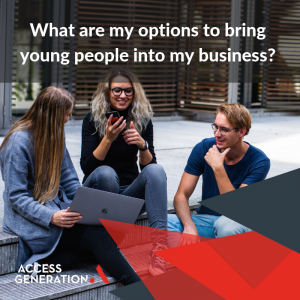
College recruits versus graduates
So you want to recruit young talent and you’ve read or heard about the benefits that young people can bring to your workplace. But did you know, that a college recruit and graduate recruit can support your business needs in totally different ways? Let us explain and tell you the differences to help you decide which route is best for your business right now…
It might be hard to believe that there would be such a difference between someone who is 18-years-old and fresh out of college compared to someone who is 22-years-old and newly graduated. But there are some subtle differences that make these groups of the millennial and generation Z young people perfect for your business but at different times.
Before we look at your business needs and how you could benefit from the two groups, let us look at those subtle differences.
College recruits
Steve Thompson-Martyn, director of Career Directed Solutions, talks to us about his views on what a college student recruit and a graduate look like.
He said: “College recruits tend to be happy to go and try new roles, they’re more malleable, easily influenced and economically at a lower level.”
College students have fewer expectations in finding the ideal role and they understand they need to build up their experience and just go out into the world to get that experience under their belt.
Graduate recruits
Despite there being an over-supply for graduates in recent years, this group of young people are holding out for the perfect job.
Steve said: “Graduates leave university with high expectations in search of the perfect role yet they are crippled with student debt which could lead to issues around wellbeing and mental health as they head into the workforce.”
“Graduates are educated out. They tend to have more life skills, self-awareness and independence for life and work.”
This group will be less satisfied in their job search if a role requires lots of formal training, again (educated out). They want to be developed on the job but this has to be delivered in a supportive way through mentoring and on the job experience.
Whichever group fits your business needs, you need to understand that young people, in general, are more adaptable to change.
Steve said: “Employers need to understand that they will be contributing to the young person’s lifetime employability. A job for life doesn’t exist anymore. The boredom threshold is lower and people are more socially mobile.”
Summary
The key facts about college recruits:
- Expectations are practical and realistic
- Willingness to learn in the workplace
- Easier to shape to meet the specific needs of a job role
- Happy to continue learning on the job and attain a qualification
College recruits can fulfil existing resource or skills gaps through an apprenticeship scheme and bring almost immediate benefit to a company. This approach delivers the appropriate work-related qualification for employees with support from educational and training establishments potentially attracting funding*.
The key facts about graduates:
- They have learning fatigue
- Feel the pressure of student debt
- Have high expectations from work and life
- Have more developed social skills
- Are more likely to challenge existing ways of working
Graduates can be really successfully applied to project work, problem-solving and can form part of your plan for succession. They will give the business a return on investment in the medium to long term. It is worth being guarded against using a graduate resource to fill a gap to solve a short term need. If you want to ensure they are part of your succession plans then you need to invest in them and be prepared to wait for the return on your investment.
Free guidance – what are my options to bring young people into my business?
Download this free guide to see all the options a business has to bring young people into the workplace
*Find out more about funding available via the Government















